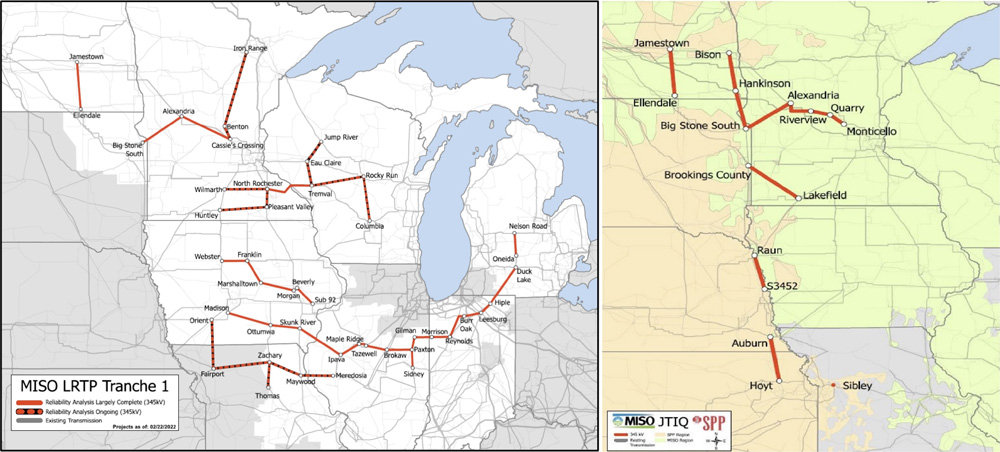MISO stakeholders continue to voice frustration over two transmission projects included in both MISO’s long-range planning and its interregional Joint Targeted Interconnection Queue (JTIQ) study with SPP.
Multiple stakeholders during Tuesday’s Planning Advisory Committee meeting asked why the RTO continues to show the projects on both its long-range and JTIQ maps. (See MISO Long-range Tx Plan Overlaps with SPP Study.)
Andy Witmeier, the grid operator’s director of resource utilization, said a long-range allocation mechanism is in place while MISO and SPP are just beginning cost-sharing negotiations for JTIQ projects. (See MISO, SPP Regulators to Engage on Tx Cost Allocation.)
Witmeier said while MISO is keeping its options open, it’s almost certain that the two recommended lines in both plans will end up in the long-range analysis. “The benefits to MISO far exceed the costs. The benefits to SPP are small,” he said.
 Comparison of projects in MISO’s long-range transmission plan (left) and MISO and SPP’s JTIQ study. The overlapping projects are in the Dakotas and Minnesota. | MISO and SPP
Comparison of projects in MISO’s long-range transmission plan (left) and MISO and SPP’s JTIQ study. The overlapping projects are in the Dakotas and Minnesota. | MISO and SPP
MISO’s Jarred Miland said staff is finalizing long-range project recommendations and will have the first of four portfolios ready for the Board of Directors’ approval in June.
The RTO has said repeatedly that its long-range plan takes precedence over the JTIQ’s project proposals.
“Shouldn’t there be some way of discussing the [project] hierarchy?” energy consultant Kavita Maini asked.
Maini said that MISO should devise some way to allocate a portion of costs to SPP because it knows the other RTO will benefit from the two projects. Other stakeholders chimed in, asking staff to find some way to ensure SPP’s load shoulders some costs, even if they are small.
Otter Tail Power’s Stacy Herbert, who also represents MISO’s transmission owners sector, said many stakeholders seem to mistakenly assume that the two JTIQ projects will move ahead despite the minimal benefit to SPP. She pointed out that historically, the two grid operators don’t ultimately agree on potential projects.
“Projects that move forward are those that have a more even sharing of benefits,” Herbert said. She also said that SPP could share in the long-term project costs through export charges once they are built.
Clean Grid Alliance’s Natalie McIntire asked that the RTOs quickly schedule their JTIQ meetings this year so stakeholders have notice when the next discussions will occur.




